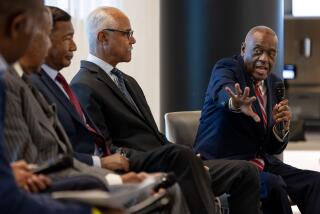Ex-Soldiers Parachute Into High Tech
- Share via
The Army trained infantry Maj. Clarence Briggs to wage war and win. So when a knee injury temporarily knocked him out of action, he took aim at the high-tech world.
Recuperating at home in Fayetteville, N.C., Briggs began surfing the Internet and thumbing through technical magazines. By the time he returned to active duty a month later, he was running a small Web hosting firm from his garage.
Just four years later, his company, Advanced Internet Technologies, employs 150 people. He was named North Carolina’s Entrepreneur of the Year for 2000.
“Business is competitive,” said Briggs, 40, who quit the Army in 1997 to devote himself full time to the venture. “By the nature of what you do in the military--you train for war, you fight in war--that is the ultimate competitive experience.”
Former soldiers such as Briggs are proving to fit well within the competitive high-tech industry. And increasingly, the field is welcoming ex-military types.
Military personnel “bring structure, calmness and order. You can’t just run wild. You need that concept of structure,” said Bill Gaul, a 1980 West Point graduate and former Army pilot who now runs Destiny Group, a San Diego-based headhunting firm that matches military people with high-tech jobs.
It wasn’t always easy for ex-soldiers and sailors to break into the high-tech industry. Gaul, 42, said he spent two hours in 1986 trying to convince a Bay Area electronics company of his qualifications.
He finally succeeded, convincing the employer that his Army pilot experience constituted practical on-the-job training for the business world.
Over the last few months, Dell Computer Corp. has been actively recruiting former military personnel for their perceived integrity and ability to take charge, said Jim Cochrun, an Austin, Texas-based company staffing manager and former Marine.
He acknowledged that some employers remain reluctant to hire someone who entered the service right out of high school, but more and more firms are taking the chance.
“It’s been a very quiet revolution over the last two or three years,” he said.
Tech firms and the military also have in common “standing operating procedures that must be followed to arrive at the best decision,” said Andrew Grimalda, 45, vice president for finance at Nano, a New York-based technology company.
“The military teaches that, tech companies want and need that, so that makes a good match,” he said.
Grimalda graduated from West Point in 1978 and spent 11 years in active service. He worked at two dot-coms and an insurance company before landing last June at Nano, which provides software and services for Internet-based commerce. Grimalda is one of three former military members at the company, which employs 50.
The crossover is not limited to men, Gaul said. Women who have served in the military are in high demand in the tech world. About 15% of the people he places are female.
“If a woman can operate in a man’s world like the military, she can operate anywhere,” he said.






